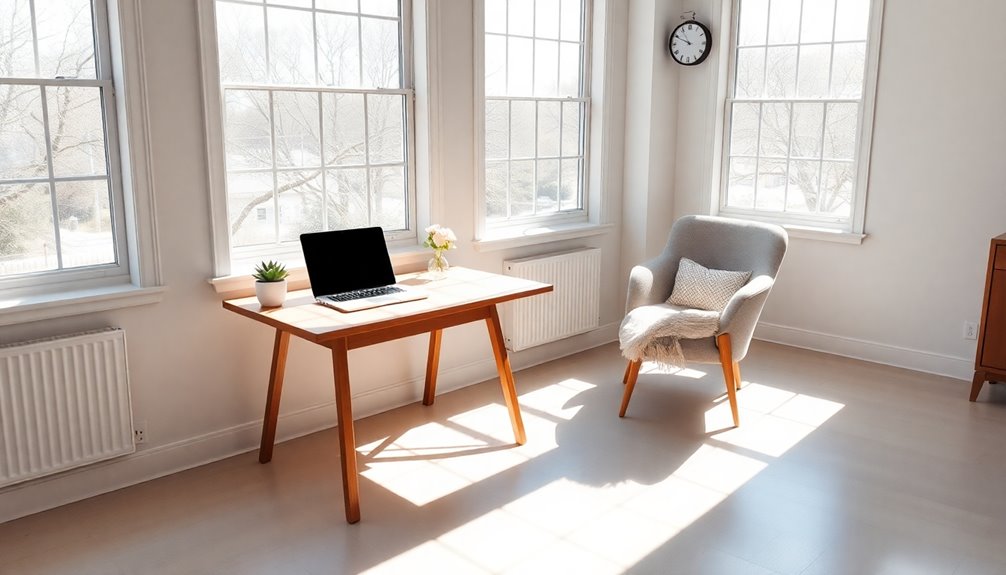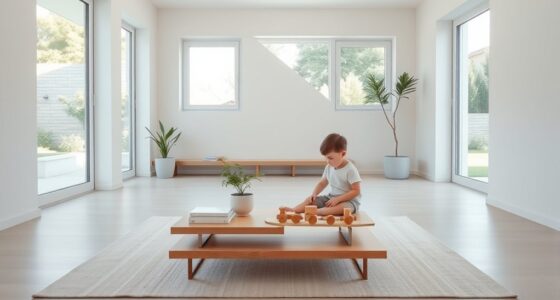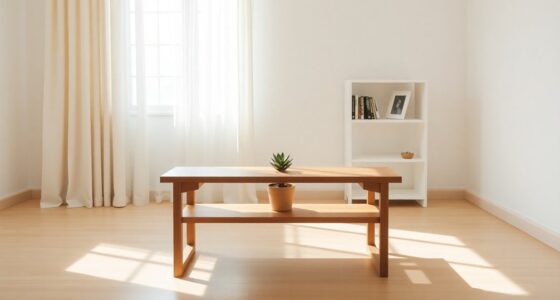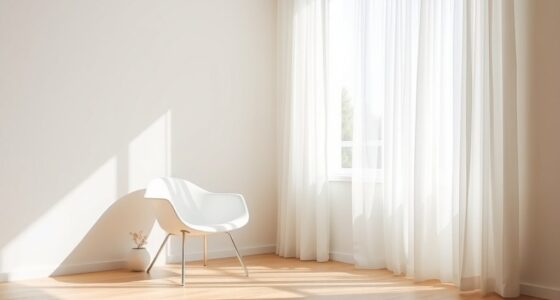To embrace a more focused, minimalist lifestyle, start with a simple morning routine. Simplify your wardrobe by decluttering regularly and choosing versatile pieces. Shop mindfully to avoid unnecessary purchases and practice daily gratitude to boost positivity. Be intentional with your time—use your yeses wisely and set tech boundaries for better mental clarity. Keep your space tidy by cleaning as you go. Interested in more ways to enhance your life? There's plenty more to explore!
Key Takeaways
- Establish a simple morning routine with mindful practices like meditation or stretching to boost energy and focus for the day.
- Regularly declutter your space by removing items that no longer serve you, creating a calming and organized environment.
- Practice daily gratitude by writing down three things you appreciate each day to foster positive emotions and resilience.
- Be intentional with your time and commitments by selectively saying yes to activities that enrich your life and relationships.
- Shop mindfully by prioritizing quality over quantity and creating a needs-based shopping list to reduce impulsive purchases.
Embrace a Simple Morning Routine
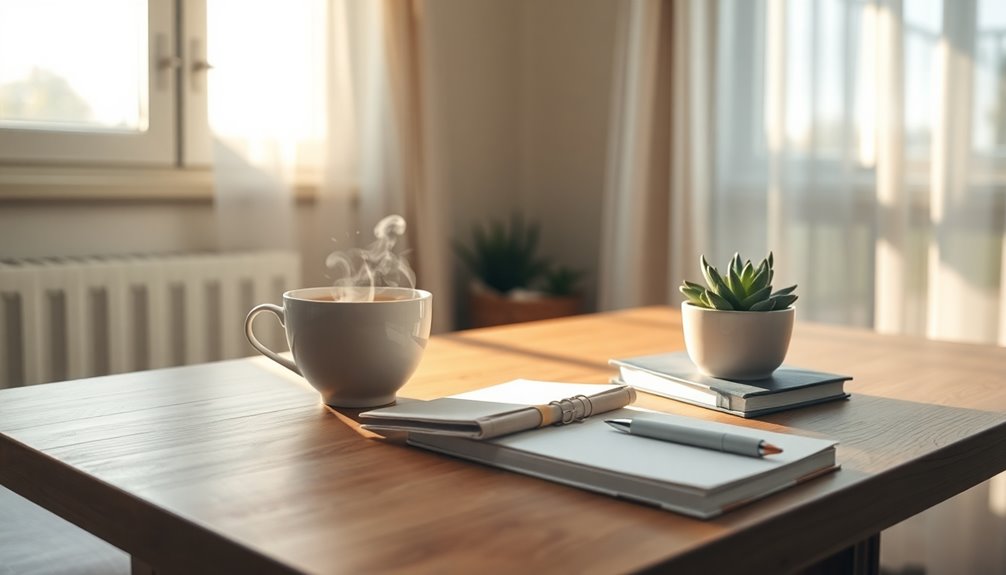
When you embrace a simple morning routine, you set a positive tone for the rest of your day. By engaging in mindful activities like meditation, stretching, or a peaceful walk, you boost your energy and enhance your focus.
These intentional practices not only reduce stress but also support your mental health, creating a calm start that carries through your day. Incorporating joyful elements, such as reading or listening to music, elevates your mood and encourages intentional living.
Plus, a consistent routine minimizes decision fatigue, helping you feel more organized. Research shows that individuals with uncomplicated morning routines report higher productivity and overall well-being, making it clear that a simple morning can lead to a more fulfilling day. Additionally, practices like mindfulness meditation can further enhance focus and emotional health.
Simplify Your Wardrobe
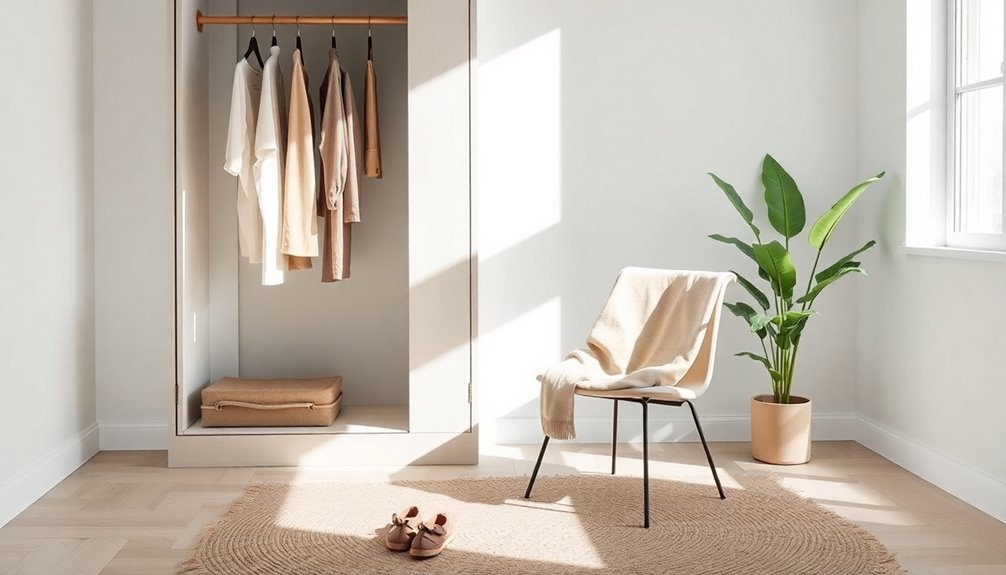
Simplifying your wardrobe starts with regularly decluttering your closet, making room for only what you truly love and wear.
By choosing versatile pieces that you can mix and match, you'll not only enhance your personal style but also reduce decision fatigue.
This mindful approach to your clothing can lead to a more organized life and boost your confidence each day. Additionally, adopting a budgeting plan can help you make thoughtful purchases that align with your minimalist lifestyle.
Declutter Your Closet Regularly
Regularly decluttering your closet can transform your daily routine. By simplifying your wardrobe, you reduce decision fatigue, making outfit selection quicker and less overwhelming.
To effectively declutter your home, consider the following:
- Remove items that don't fit – They only take up space.
- Let go of clothes you haven't worn in a year – If it's not serving you, it's time to part ways.
- Keep only pieces that spark joy – Your wardrobe should make you feel good.
- Commit to a seasonal decluttering schedule – This helps maintain a peaceful, organized closet.
Embracing minimalist living not only saves time but also boosts your self-image by allowing you to wear clothes you truly love. Additionally, this process can lead to increased mental clarity as a tidy environment enhances productivity and focus.
Choose Versatile Clothing Pieces
Many people find that choosing versatile clothing pieces can greatly streamline their wardrobes. By selecting items like a classic white shirt or well-fitted jeans, you can easily mix and match, reducing the total number of items you own.
Investing in high-quality, timeless pieces not only saves money over time but also minimizes the need for frequent replacements. Creating a capsule wardrobe of about 30-40 pieces can simplify your life by easing daily outfit choices and reducing decision fatigue, helping you enjoy a more focused morning routine.
Prioritize versatile clothing that adapts from casual to formal settings, giving you flexibility for various occasions. Regularly assess your wardrobe to keep only items that fit well and you love, enhancing your minimalist lifestyle. Additionally, consider integrating sustainable materials into your clothing choices, as they contribute to a healthier environment and promote ethical consumption.
Cultivate Personal Style Mindfully
Cultivating a mindful personal style can transform your wardrobe and daily routine. By simplifying your wardrobe, you can enhance decision-making and reduce stress.
Here are four tips to help you cultivate your style:
- Focus on Versatility: Choose pieces that can be mixed and matched easily.
- Regular Declutter: Eliminate the stuff you haven't worn in the past year to create a more organized space.
- Embrace Quality: Practice mindful shopping habits by investing in long-lasting items rather than cheap, disposable clothing.
- Reflect Your Preferences: Select items that resonate with your authentic self to boost confidence and enjoyment in getting dressed. Additionally, consider creating a mood board to visualize your personal style and ensure your wardrobe aligns with your desired aesthetic.
Declutter Your Home Regularly
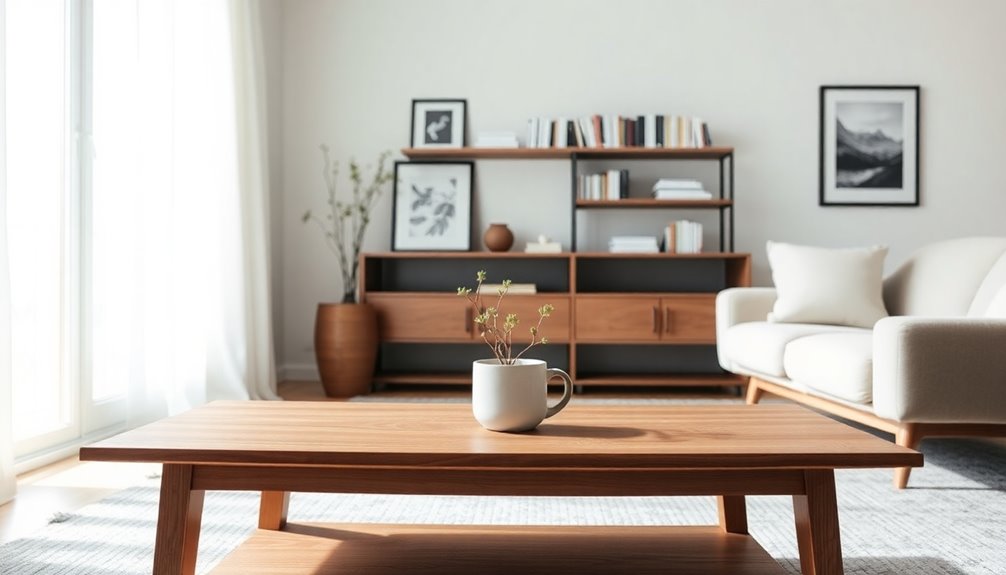
Regularly decluttering your home can transform your space and your mindset.
By removing items that don't serve you, you create an environment that fosters peace and creativity.
Let's explore the benefits of decluttering, effective techniques to do it, and ways to maintain an organized space. Additionally, incorporating herbal infusion machines can help streamline your cooking process, allowing you to keep your kitchen organized and efficient.
Benefits of Decluttering Regularly
While you mightn't realize it, decluttering your home regularly can lead to significant improvements in your mental well-being.
Maintaining a clutter-free space has a positive impact on various aspects of your life. Here are some benefits you can experience:
- Reduced Stress: 82% of people feel less stressed in organized spaces.
- Enhanced Focus: A clean environment minimizes distractions, improving your decision-making abilities.
- Boosted Creativity: Regular decluttering fosters higher levels of creativity and productivity.
- Empowerment: Establishing decluttering habits promotes a sense of control and emotional health. Additionally, it can support mental wellbeing by creating a more harmonious living environment.
Effective Decluttering Techniques
Maintaining the mental benefits of a decluttered space requires effective techniques to keep your home organized. Start by scheduling regular decluttering sessions and tackle one area at a time to avoid feeling overwhelmed. Implement the "one in, one out" rule to maintain a clutter-free environment. Consider using the Marie Kondo method—ask yourself if an item sparks joy to make intentional decisions about what to keep. Here's a simple guide to help you:
| Technique | Description |
|---|---|
| Regular Sessions | Schedule quarterly or biannual decluttering sessions. |
| One In, One Out | Remove an item for every new one you bring in. |
| Focused Approach | Declutter one room or closet at a time. |
| Joy Assessment | Keep items that spark joy using the Kondo method. |
These effective decluttering techniques can lead you to a life-changing minimalist lifestyle. Additionally, implementing space optimization strategies can further enhance your living environment by creating a more functional and serene atmosphere.
Maintaining an Organized Space
To keep your home organized and inviting, it's essential to declutter regularly. This practice not only enhances your space but also promotes your minimalist habits.
Here are four steps to maintain an organized space:
- Assess belongings every few months and remove items you haven't used in the past year.
- Focus on versatile items you love, simplifying your choices and enhancing personal style.
- Create designated spaces for everything, making it easier to keep things tidy.
- Incorporate daily decluttering rituals, like spending 10 minutes each evening organizing. Additionally, ensure that your space has proper airflow to enhance the overall atmosphere and maintain a fresh environment.
Shop Mindfully
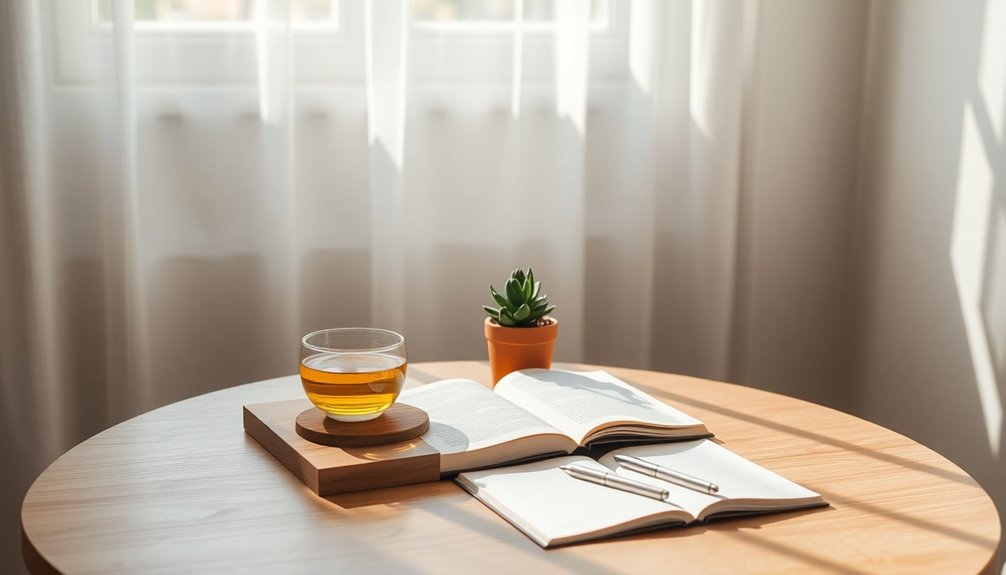
Shopping mindfully can transform not just your wallet but also your living space. By embracing mindful shopping, you focus on quality over quantity, which means investing in durable items that won't need replacing often. This can cut your annual spending on goods by as much as 30%.
Additionally, setting a waiting period of at least one week before purchases helps you assess necessity, reducing buyer's remorse. Create a shopping list based on your actual needs and stick to it to eliminate unplanned purchases by around 50%.
When you engage in these practices, you'll find yourself with less stuff, leading to a more organized environment and a greater appreciation for the items you've intentionally chosen. Moreover, being aware of nutritional information can help you make healthier choices when shopping for food, enhancing your overall well-being. Enjoy the benefits of a minimalist lifestyle!
Practice Daily Gratitude
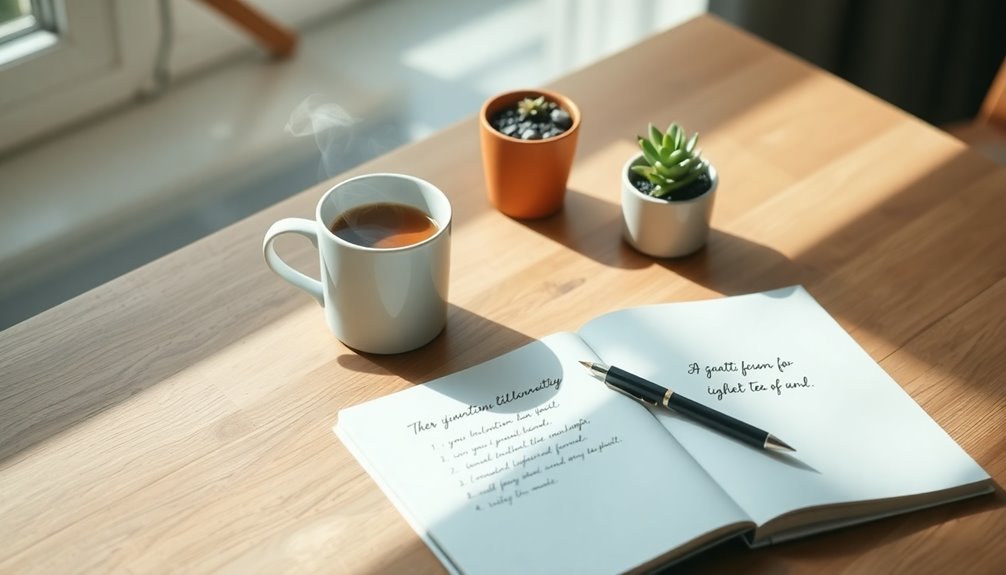
How often do you take a moment to appreciate the little things in life? Practicing daily gratitude can greatly enhance your mental health and simplify your outlook.
Here are some easy ways to get started:
- Keep a gratitude journal: Write down three things you're thankful for each day.
- Acknowledge small joys: Appreciate a sunny day or a friend's kind gesture.
- Reflect regularly: Spend a few moments each evening recognizing what made you smile that day.
- Share your gratitude: Tell someone you appreciate them for a meaningful connection.
Incorporating these habits into your routine can boost positive emotions, improve resilience, and foster a focused mindset that aligns perfectly with a minimalist lifestyle.
Use Your Yeses Wisely
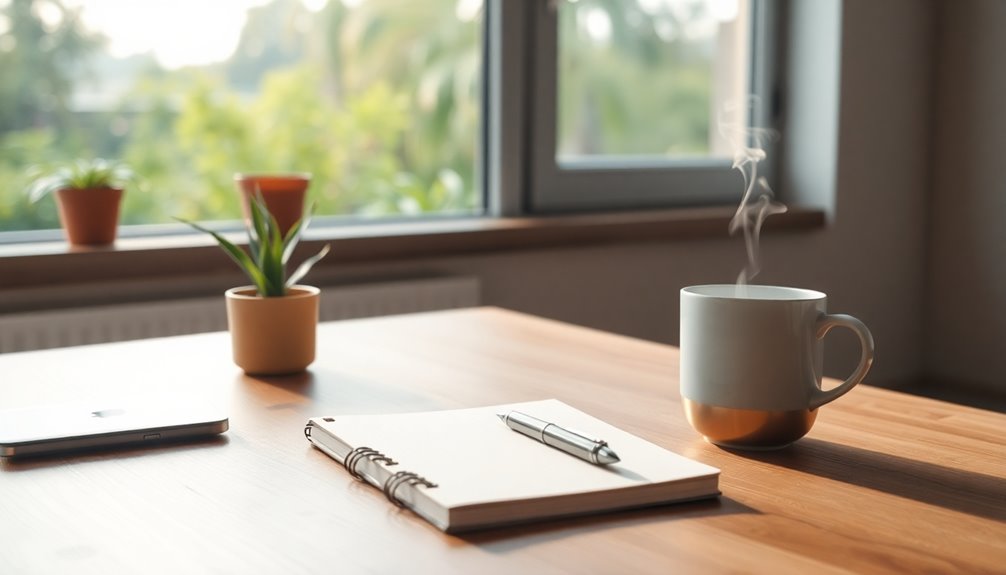
Embracing gratitude helps you appreciate what truly matters, but it's equally important to be mindful of how you allocate your time and energy. By purposefully choosing your commitments, you create an intentional schedule that cuts down calendar clutter.
This approach fosters deeper relationships, allowing you to build a strong support system around you. Changing your mindset about saying yes can lead to a more fulfilling life, reducing stress and feelings of overwhelm.
With more free time from selective yeses, you can embrace spontaneous outings that enrich your daily experiences. Regular mindfulness practices help clarify your priorities, making it easier to discern which opportunities align with your values.
Use your yeses wisely, and watch your life transform into a more focused, minimalist lifestyle.
Use Technology Intentionally

Technology can be a double-edged sword in our lives, offering both connection and distraction. To use it intentionally, consider these habits:
- Set Boundaries: Designate screen-free times to improve your mental health and strengthen relationships.
- Curate Content: Regularly assess what you consume online to enhance the quality of information and engagement.
- Model Behavior: Teach children the importance of intentional technology use by demonstrating healthy habits.
- Engage in Digital Detoxes: Take breaks from screens to gain mental clarity and appreciate offline experiences.
Clean and Tidy as You Go

A clean and tidy space can greatly enhance your daily life. When you clean and tidy as you go, you immediately return items to their designated places, keeping your environment organized and reducing clutter over time.
By addressing small messes promptly, you prevent dirt and disorder from piling up, making cleaning less overwhelming later. This habit fosters a sense of order and calm, positively impacting your mental well-being and productivity.
Establishing a routine of tidying as you go leads to clearer surfaces and open spaces, enhancing the perception of tidiness in your living areas.
Consistently practicing this habit creates a visually calming environment, making it easier for you to focus on tasks without distractions from clutter.
Regularly Do a Digital Detox
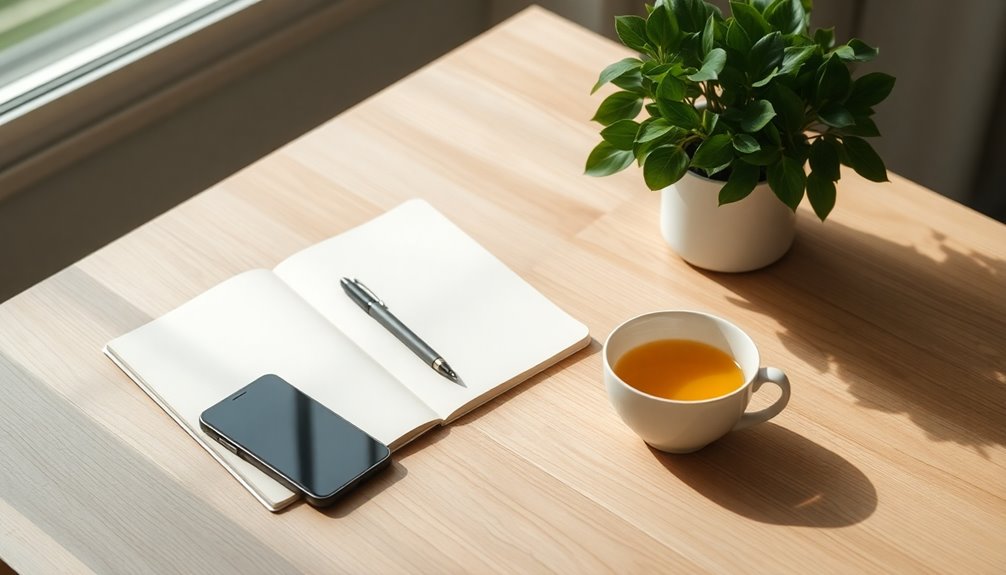
While it might feel impossible to unplug in our hyper-connected world, regularly doing a digital detox can be a game changer for your mental health.
By intentionally stepping away from screens, you can reduce stress and anxiety while enhancing mindfulness.
Here's how to start:
- Set Boundaries: Limit social media to 30 minutes daily during detox periods.
- Choose Detox Days: Take a day or weekend completely off from digital devices.
- Engage in Hobbies: Reclaim time for reading, exercising, or spending time in nature.
- Reconnect: Foster face-to-face interactions with friends and family.
Frequently Asked Questions
What Is the 30/30 Rule for Minimalists?
The 30/30 Rule is a productivity technique where you work for 30 minutes, then take a 30-minute break.
This approach helps you maintain focus while avoiding burnout. By breaking your work into manageable chunks, you give your mind a chance to reset, enhancing creativity and decision-making.
It's adaptable to any work environment, making it a great tool for you as you pursue a more intentional and minimalist approach to your daily tasks.
How to Start a Minimalist Lifestyle for Beginners?
Are you ready to simplify your life? Start small by tackling just one area, like a cluttered drawer. As you clear it out, you'll feel a weight lift.
Implement a "one in, one out" rule to keep clutter at bay. Gradually cut down on digital distractions by unsubscribing from emails and limiting social media.
Seek inspiration from books or online communities—connecting with others can motivate you on this minimalist journey.
What Is the 90 10 Rule in Minimalism?
The 90/10 Rule in minimalism suggests that 90% of your happiness comes from just 10% of your possessions.
It encourages you to identify the items that truly add value to your life, while letting go of the rest. By focusing on what matters most, you simplify decision-making and reduce clutter.
This approach helps you create a more intentional lifestyle, fostering appreciation for quality over quantity in the belongings you choose to keep.
What Is the 20 Rule Minimalist?
The 20 Rule in minimalism suggests that for every new item you bring into your home, you should remove 20 items. This practice helps you maintain balance and prevent clutter.
Conclusion
By adopting these simple habits, you can create a more focused, minimalist lifestyle that enhances your well-being. Did you know that decluttering can reduce stress levels by up to 40%? As you embrace a simpler way of living, you're not just clearing your space; you're also clearing your mind. Remember, it's about the quality of what you keep, not the quantity. Start small, stay consistent, and enjoy the freedom that comes with a more intentional life!
